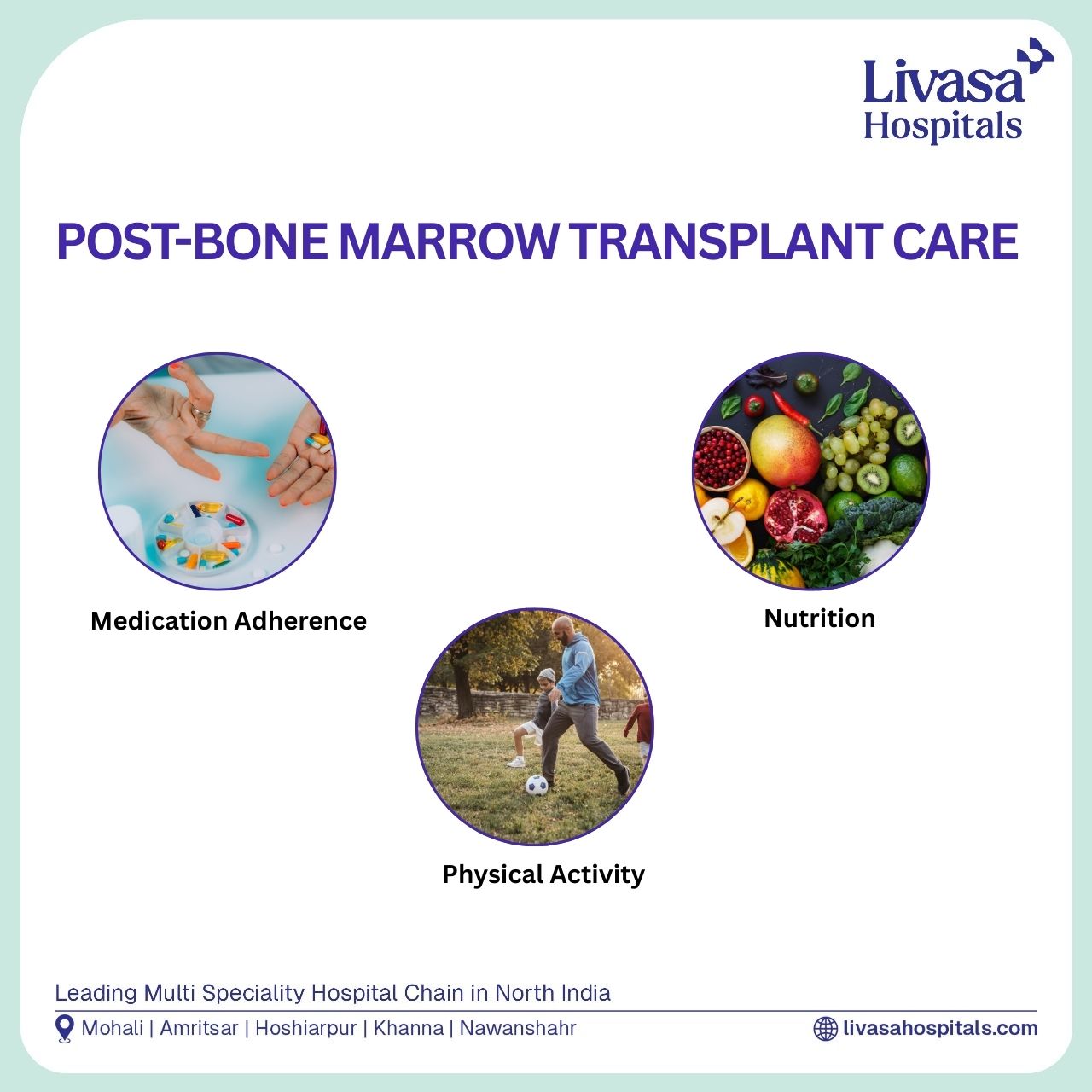03 Feb 2026
Rhinoplasty Revision Surgery in Mohali: Cost When Your First Nose Job Fails


Dr. Mukesh Chawla
22 May 2025
Call +91 80788 80788 to request an appointment.
A bone marrow transplant (BMT) is a complex medical procedure that can be crucial for patients suffering from certain types of cancer, blood disorders, and immune deficiencies. This procedure involves replacing damaged or diseased bone marrow with healthy stem cells, aiming to restore the body’s ability to produce healthy blood cells. While BMT can offer a new lease on life, the recovery process is both critical and challenging. Understanding what to expect during recovery after bone marrow transplantation can empower patients and their families, helping them to navigate this significant journey.
Bone marrow transplantation is typically required for conditions such as leukemia, lymphoma, multiple myeloma, and certain inherited blood disorders. The procedure involves several steps including pre-transplant preparation, the actual transplant, and the subsequent recovery phase. During the transplant, stem cells are either collected from a donor or harvested from the patient’s own body prior to the procedure.
Livasa Hospitals offer comprehensive bone marrow transplant services in Punjab, guided by skilled specialists dedicated to maximizing success rates and minimizing risks. Each patient’s unique circumstances will dictate the type and approach to BMT — either autologous (using the patient’s own stem cells) or allogeneic (using stem cells from a matched donor).
Before a bone marrow transplant, extensive pre-transplant evaluations are performed. This phase includes a thorough assessment of the patient's overall health, identification of a suitable stem cell donor, and planning the treatment. The healthcare team may recommend chemotherapy or radiation therapy to prepare the patient's body for transplantation by destroying diseased cells. Understanding the pre-transplant preparation can alleviate anxiety as patients can feel informed and empowered throughout the treatment journey.
Immediately following a bone marrow transplant, patients typically stay in a specially designated area of the hospital known as a transplant unit. This environment is designed to minimize exposure to infections as the immune system may be significantly weakened. Patients will undergo constant monitoring for any potential complications, such as infections, bleeding, or reactions to the transplanted stem cells.
It is common for patients to experience side effects from pre-transplant treatments, as well as the effects of the transplant itself. Side effects may include nausea, low blood counts, fatigue, and discomfort. The healthcare team will be dedicated to managing these symptoms, and relief will be a priority.
Recovery after bone marrow transplantation is a gradual process that can vary significantly between individuals. It is essential for patients to closely monitor their health and follow the guidance of their healthcare providers. Some critical aspects of recovery include:
Patients often face various challenges during their recovery phase. The most commonly reported challenges post-transplant include:
The healthcare team at Livasa Hospitals understands these challenges and provides tailored support and treatment to help patients overcome them while ensuring a smoother transition from hospital to home recovery.
After discharge, patients continue their recovery at home, where supportive care remains crucial. Key components of post-bone marrow transplant care include:

Long-term recovery after a bone marrow transplant can continue for months or even years. Some patients may experience late effects from the treatment, including secondary cancers, fertility issues, and organ dysfunction. Continuous follow-ups with oncologists and other specialists like endocrinologists or cardiologists will be crucial in managing these risks.
Regular screenings and lifestyle modifications can enhance the quality of recovery, helping to ensure that patients can lead fulfilling lives post-transplant. Building a supportive network of family and friends will also benefit emotional health during this transition.
The psychological aspect of recovery cannot be overlooked. Many patients may face emotional challenges such as anxiety, depression, or emotional distress during and after their BMT journey. Support groups, counseling, and mental health services available at Livasa Hospitals can offer valuable assistance in processing these complex emotions.
Engaging with peers who share similar experiences can foster healing and alleviate feelings of isolation, thus playing an essential role in the holistic recovery process.
Recovery after bone marrow transplantation is a multi-faceted journey that requires a comprehensive approach to care encompassing physical, emotional, and psychological support. Understanding what to expect can help patients and families prepare for the upcoming transitions, thus fostering resilience during difficult times.
If you are seeking bone marrow transplant specialists in Punjab with a high success rate, consider Livasa Hospitals. Our dedicated team is here to provide unparalleled support and expertise in your recovery journey, ensuring your path back to health is as smooth as possible. For more information or to book an appointment, please call us at +91 80788 80788 or visit our website.
Staying informed and taking proactive steps in your recovery can significantly improve your quality of life. Connect with us to learn more about our post-bone marrow transplant care in Punjab and how we can assist you in your healing process.
Rhinoplasty Revision Surgery in Mohali: Cost When Your First Nose Job Fails
Plastic Surgery After Massive Weight Loss: Body Contouring Packages in Mohali
ENT + Cosmetic in Mohali: Septoplasty for Breathing with Cosmetic Rhinoplasty Offers
Livasa Healthcare Group Corporate Office,Phase-8, Industrial Area, Sector 73, Sahibzada Ajit Singh Nagar, Punjab 160071
| Mohali | +91-99888 23456 |
| Amritsar | +91-99887 49494 |
| Hoshiarpur | +91-99883 35353 |
| Nawanshahr | +91-75081 82337 |
| Khanna | +91-98888 05394 |